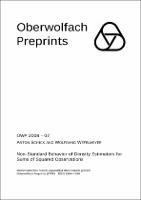Abstract
It has been shown recently that, under an appropriate integrability condition, densities of functions of independent and identically distributed random variables can be estimated at the parametric rate by a local U-statistic, and a functional central limit theorem holds. For the sum of two squared random variables, the integrability condition typically fails. We show that then the estimator behaves differently for different arguments. At points in the support of the squared random variable, the rate of the estimator slows down by a logarithmic factor and is independent of the bandwidth, but the asymptotic variance depends on the rate of the bandwidth, and otherwise only on the density of the squared random variable at this point and at zero. A functional central limit theorem cannot hold. Of course, for bounded random variables, the sum of squares is more spread out than a single square. At points outside the support of the squared random variable, the estimator behaves classically. Now the rate is again parametric, the asymptotic variance has a different form and does not depend on the bandwidth, and a functional central limit theorem holds.

